Unit5 What will I be like 第2课时 语法知识及拓展 课件(共29张PPT)
文档属性
| 名称 | Unit5 What will I be like 第2课时 语法知识及拓展 课件(共29张PPT) |
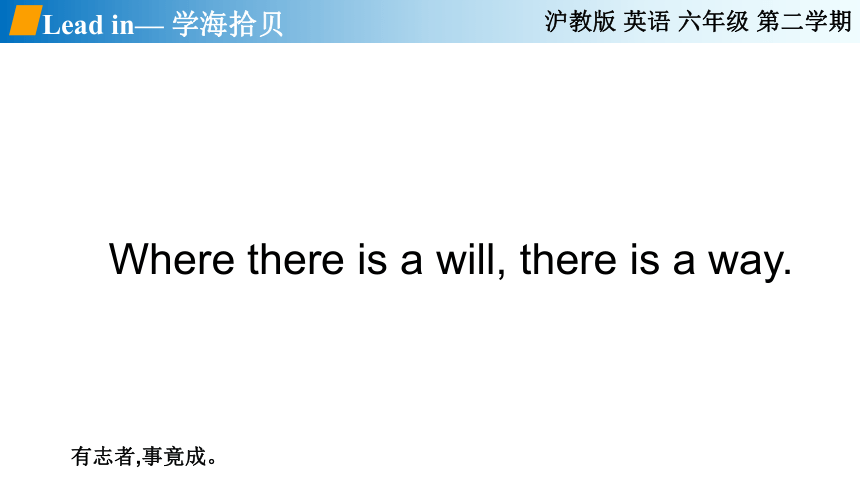
|
|
| 格式 | pptx | ||
| 文件大小 | 1.6MB | ||
| 资源类型 | 试卷 | ||
| 版本资源 | 牛津上海版(试用本) | ||
| 科目 | 英语 | ||
| 更新时间 | 2022-03-09 15:43:07 | ||
图片预览


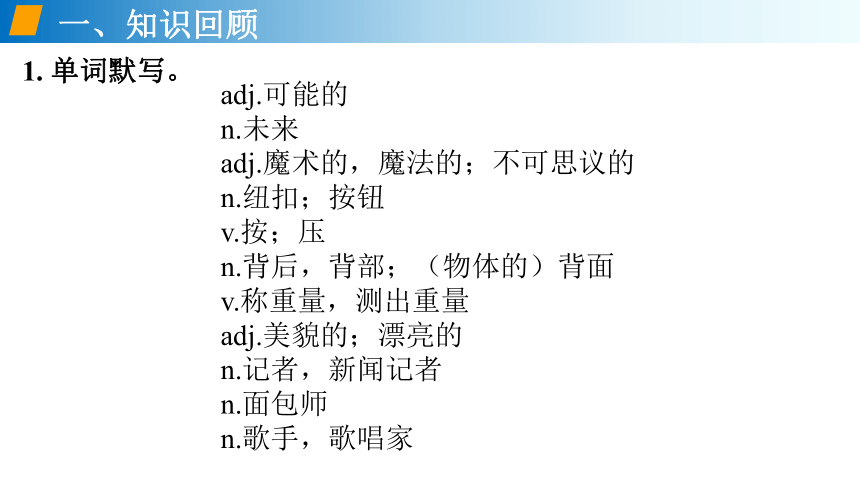
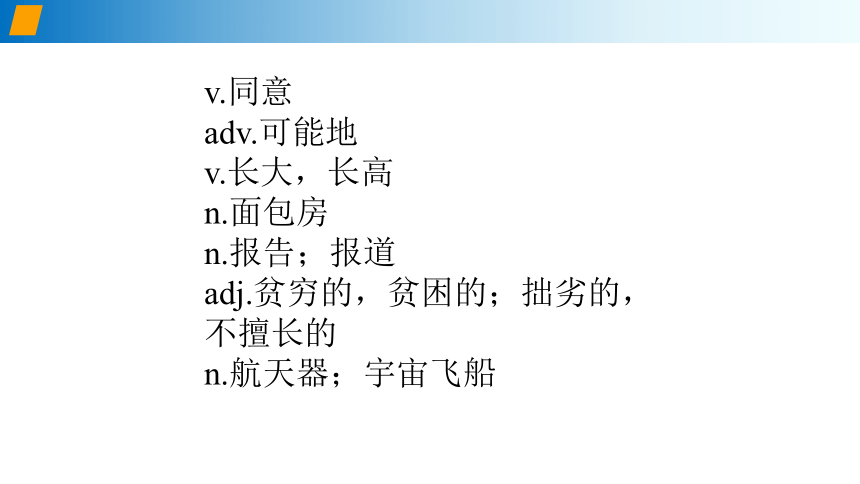
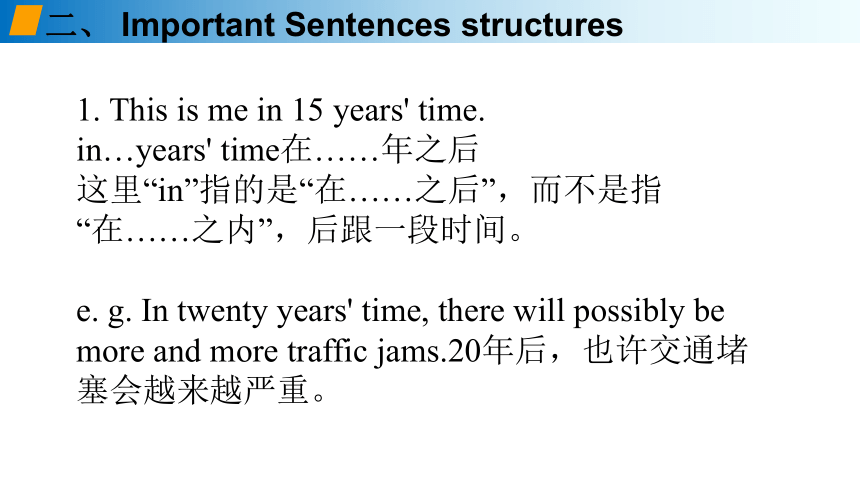
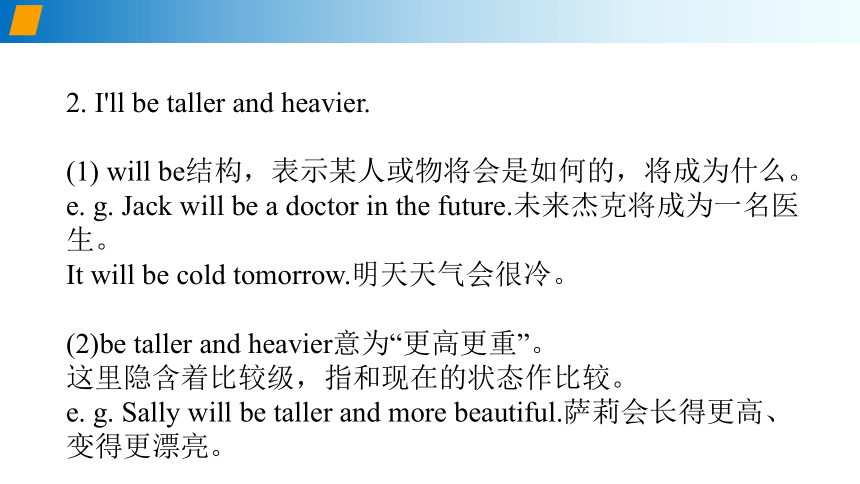
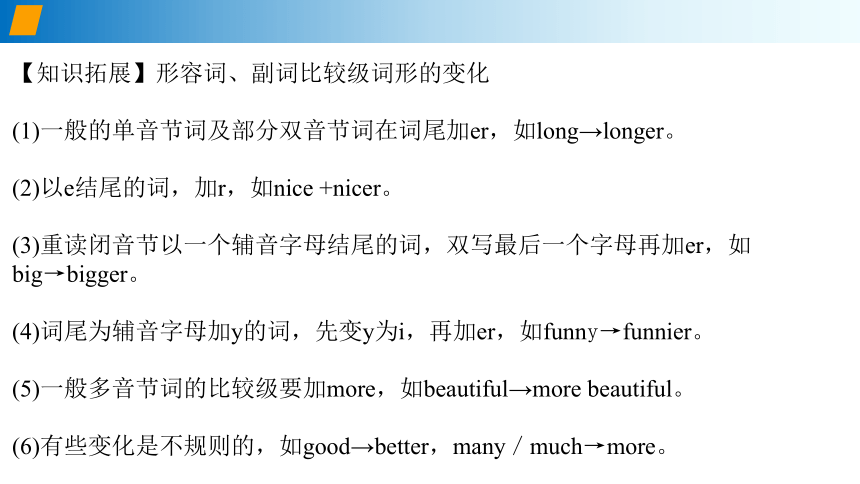
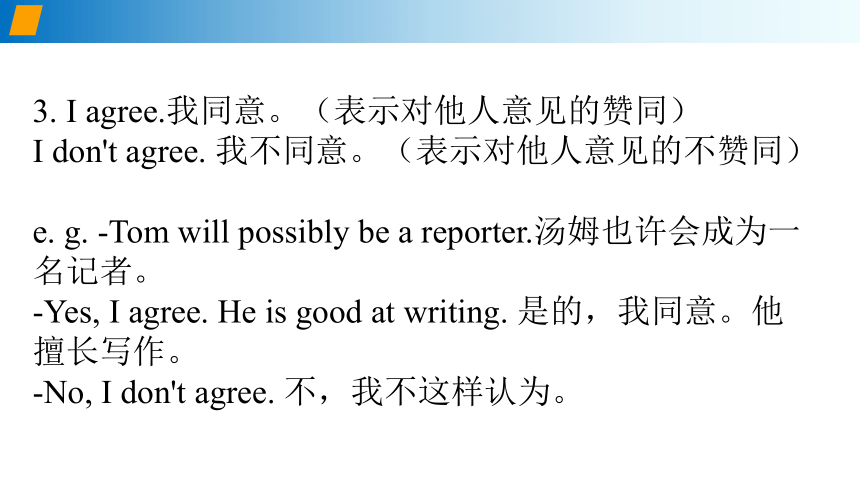
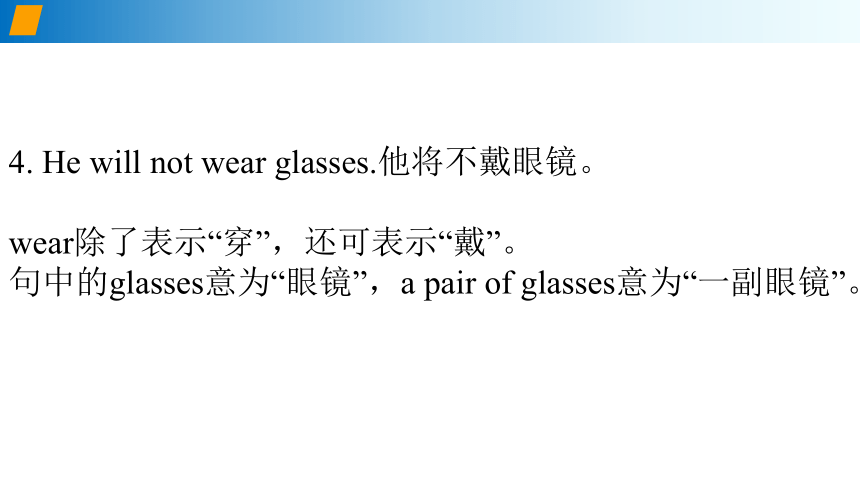
文档简介
(共29张PPT)
Where there is a will, there is a way.
有志者,事竟成。
沪教版 英语 六年级 第二学期
Lead in— 学海拾贝
Snow and Ice Knowledge 冰雪知识
Cross-country Skiing
沪教版 英语 六年级 第二学期
一、知识回顾
1. 单词默写。
adj.可能的
n.未来
adj.魔术的,魔法的;不可思议的
n.纽扣;按钮
v.按;压
n.背后,背部;(物体的)背面
v.称重量,测出重量
adj.美貌的;漂亮的
n.记者,新闻记者
n.面包师
n.歌手,歌唱家
v.同意
adv.可能地
v.长大,长高
n.面包房
n.报告;报道
adj.贫穷的,贫困的;拙劣的,不擅长的
n.航天器;宇宙飞船
二、 Important Sentences structures
1. This is me in 15 years' time.
in…years' time在……年之后
这里“in”指的是“在……之后”,而不是指“在……之内”,后跟一段时间。
e. g. In twenty years' time, there will possibly be more and more traffic jams.20年后,也许交通堵塞会越来越严重。
2. I'll be taller and heavier.
(1) will be结构,表示某人或物将会是如何的,将成为什么。
e. g. Jack will be a doctor in the future.未来杰克将成为一名医生。
It will be cold tomorrow.明天天气会很冷。
(2)be taller and heavier意为“更高更重”。
这里隐含着比较级,指和现在的状态作比较。
e. g. Sally will be taller and more beautiful.萨莉会长得更高、变得更漂亮。
【知识拓展】形容词、副词比较级词形的变化
(1)一般的单音节词及部分双音节词在词尾加er,如long→longer。
(2)以e结尾的词,加r,如nice +nicer。
(3)重读闭音节以一个辅音字母结尾的词,双写最后一个字母再加er,如big→bigger。
(4)词尾为辅音字母加y的词,先变y为i,再加er,如funny→funnier。
(5)一般多音节词的比较级要加more,如beautiful→more beautiful。
(6)有些变化是不规则的,如good→better,many/much→more。
3. I agree.我同意。(表示对他人意见的赞同)
I don't agree. 我不同意。(表示对他人意见的不赞同)
e. g. -Tom will possibly be a reporter.汤姆也许会成为一名记者。
-Yes, I agree. He is good at writing. 是的,我同意。他擅长写作。
-No, I don't agree. 不,我不这样认为。
4. He will not wear glasses.他将不戴眼镜。
wear除了表示“穿”,还可表示“戴”。
句中的glasses意为“眼镜”,a pair of glasses意为“一副眼镜”。
【指点迷津】wear, put on, dress的区别
(1) wear做动词,意为“穿;戴”,表示穿或戴的状态。
e. g. The girl likes wearing a pair of brown shoes.这个女孩喜欢穿棕色的鞋子。
(2) put on意为“穿上”,表穿的动作,即原来没有穿着后来穿上了。
e. g. It's raining outside. Put on your raincoat.外面在下雨,穿上你的雨衣。
(3) dress做动词,意为“(给……)穿衣”。表示给某人穿衣的动作,通常构成结构:dress sb“给某人穿衣”,dress oneself“
自己穿衣”,get dressed“穿着……”,be dressed in“穿着……”或 dress up“打扮”。
e. g. Can you dress the baby for me 你能替我给婴儿穿衣服吗?
Rewrite the sentence as required.
1. Joe will be tall in the future. (改成否定句)
Joe ____________ ____________ tall in the future.
2. I have to finish my homework first. (改为一般疑问句)
____________you to finish your homework first.
3. Ben is a policeman. (对划线部分提问)
____________ ____________Ben
4. Jill plays football very well. (保持句意不变)
Jill is____________ ____________ football.
5. Bill will be 1.8 metres tall in 10 years. (划线部分提问)
____________ ___________ will Bill be 1.8 metres
【Keys】1. won't be 2. Do, have 3. What is 4. good at 5. How soon
【随堂小练】
for
动词
实义动词
Be动词
助动词
情态
动词
Take go have play speak
am is are was were
will have
can/could may/might must
have to will/would
三、语法讲解
1、情态动词
since
for
Can
表能力,“能够”
翻译:我能吃四碗饭
I can eat four bowls of rice.
for
Can
(2)表允许,“可以”
翻译:我现在可以回家了吗?
Can I go home now
since
for
May/might
表允许,“可以”=can, 但语气更委婉
It’s so hot.
May/ might I have a drink
No, you mustn’t.
since
for
“必须,一定”,主观上
Must
I must conquer English !
You can do it !
for
I have to
finish all the
homework
tonight
Hey, Sunny~
Tomorrow
is
Weekends,
let’s play
tennis after
class.
Have to
“必须,不得不”,客观上
since
will/would
I will not let myself down.
表示意愿,“愿意”
Would you like to go shopping
with me today .
疑问句中,表有礼貌的请求
since
for
【例题精讲】
--Could I borrow your dictionary
--Of course you ____________.
A. can B. must C. should D. will
【例题精讲】
--Mary, __________you speak Chinese
--Yes, only a little.
A. must B. need C. may D. can
【例题精讲】
--Must we finish giving out the posters today
--Yes, we _______. It can't be put off any longer.
can B. may C. must D. have to
A
D
C
辨析词义,是不是
发现除了Ta其他选项
的意思都怪怪的呢
只有谁是“能”
的意思呀?
掌握情态动词
先翻译!!!!
1)动词的分类
(实义动词、be动词、情态动词、助动词)
2)各种情态动词的用法和区别
情态动词的掌握点在于语境,而语境的判断根据
翻译词义即可清楚情态动词用得是否得当
2、一般将来时
一般将来时表示在将来某个时间要发生的动作或存在的状态。
A) 一般将来时的构成
(1)由助动词“shall/will+动词原形”或“be going to+动词原形”构成,shall用于第一人称,will用于第二、三人称。在美国英语中,在陈述句中不论什么人称一律用will。
e. g. She will be a teacher next year.明年她将成为一名老师。
(2)一般将来时的否定和疑问形式:
①一般将来时的否定形式是will not缩写为won’t,shall not缩写为shan't,在“be going to+动词原形”结构中,其否定形式为在be后加not。
e. g. He won't come here tomorrow. 他明天不会来这儿。
②一般将来时的疑问形式是把will( shall)提到主语前,若是“be going to+动词原形”结构,其疑问形式是将be提到主语前。
e. g. Will she go to the bookshop tomorrow 她明天去书店吗?
一般将来时的陈述句、否定句、疑问句及简单回答形式以go为例见下表:
陈述句 否定句 疑问句 简单回答
I/Weshall go there. You/He/She/They will go there. I/We shall not go there.I/Weshan't go there. You/He/She/They will not go there.You/He/She/Theywon'tgo there. Shall I/we go there Will you/he/she/ they go there Yes, I/we shall/will.No, I/we shan't/won't.Yes, he/she/theywill.No, he/she/they won't.
B) 一般将来时的用法
(1)一般将来时表示将来某个时间将要发生的动作或存在的状态。常与表示将来的时间状语tomorrow, next week/month/year,in three days等词连用。
e. g. I will have a party next Saturday. I hope you can come.下周六我将举行一次派对,我希望你能来。
If it doesn't rain tomorrow, we are going to the Summer Palace.如果明天不下雨,我们就去颐和园。
When will the train arrive 火车什么时间到?
(2)表示预料中将要发生的动作或情况。
e. g. You will feel better after having this medicine.你吃了这药就会感觉好一些。
I think it will rain this afternoon.我今天下午会下雨。
(3)表示将来经常或反复发生的动作。
e. g. I'll come and see you every Sunday next year.明年我将每周日来看你。
We shall come to work in this factory every year.我们将每年来到这个工厂劳动。
(4)“be going to+动词原形”结构表示现在打算在最近或将来要做的事,或表示说话人根据已有的迹象认为可能要发生的事情。
e. g. It is going to rain this afternoon.今天下午要下雨。
Are you going to have a new subject next year
明年你们将学一门新学科吗?
( ) 1. Which season do you like autumn or winter
A. more B. better C. much D. best
( ) 2. We like making model ships it's interesting.
A. because B. when C. what D. how
( ) 3. My aunt is 25 years old, so she is .
A. a teenager B. an adult C. a child D. a lady
( ) 4. Long, long ago there not many people in the village.
A. was B. were C. had D. are
( ) 5. China will be much more powerful in time.
A. a few years B. few years C. a few years' D. few years'
( ) 6. Tom has eaten too much. He any bread.
A. needn't B. doesn't need
C. needn't to D. doesn't need to
( ) 7. Maggie is taller than in her class.
A. anyone B. others C. any others D. any other one
( ) 8. Sam is 150cm and he will be 30cm .
A. tall, tall B. tall, taller C. taller, tall D. taller, taller
( ) 9. On your birthday, I will some flowers to you.
A. make B. buy C. plant D. send
( ) 10. All passengers must arrive at the airport two hours before the time.
A. depart B. departure C. departing D. departed
( ) 11. I don't like the sweet rice dumplings, give me those meat .
A. one B. some C. others D. ones
( ) 12. Ask to fill in the blanks.
A. their B. theirs C. they D. them
1.B 2. A 3. B 4.B 5. C 6. B 7. D 8. B 9. D 10. B 11. D 12. D
愿君皆有所获,皆有所得
Where there is a will, there is a way.
有志者,事竟成。
沪教版 英语 六年级 第二学期
Lead in— 学海拾贝
Snow and Ice Knowledge 冰雪知识
Cross-country Skiing
沪教版 英语 六年级 第二学期
一、知识回顾
1. 单词默写。
adj.可能的
n.未来
adj.魔术的,魔法的;不可思议的
n.纽扣;按钮
v.按;压
n.背后,背部;(物体的)背面
v.称重量,测出重量
adj.美貌的;漂亮的
n.记者,新闻记者
n.面包师
n.歌手,歌唱家
v.同意
adv.可能地
v.长大,长高
n.面包房
n.报告;报道
adj.贫穷的,贫困的;拙劣的,不擅长的
n.航天器;宇宙飞船
二、 Important Sentences structures
1. This is me in 15 years' time.
in…years' time在……年之后
这里“in”指的是“在……之后”,而不是指“在……之内”,后跟一段时间。
e. g. In twenty years' time, there will possibly be more and more traffic jams.20年后,也许交通堵塞会越来越严重。
2. I'll be taller and heavier.
(1) will be结构,表示某人或物将会是如何的,将成为什么。
e. g. Jack will be a doctor in the future.未来杰克将成为一名医生。
It will be cold tomorrow.明天天气会很冷。
(2)be taller and heavier意为“更高更重”。
这里隐含着比较级,指和现在的状态作比较。
e. g. Sally will be taller and more beautiful.萨莉会长得更高、变得更漂亮。
【知识拓展】形容词、副词比较级词形的变化
(1)一般的单音节词及部分双音节词在词尾加er,如long→longer。
(2)以e结尾的词,加r,如nice +nicer。
(3)重读闭音节以一个辅音字母结尾的词,双写最后一个字母再加er,如big→bigger。
(4)词尾为辅音字母加y的词,先变y为i,再加er,如funny→funnier。
(5)一般多音节词的比较级要加more,如beautiful→more beautiful。
(6)有些变化是不规则的,如good→better,many/much→more。
3. I agree.我同意。(表示对他人意见的赞同)
I don't agree. 我不同意。(表示对他人意见的不赞同)
e. g. -Tom will possibly be a reporter.汤姆也许会成为一名记者。
-Yes, I agree. He is good at writing. 是的,我同意。他擅长写作。
-No, I don't agree. 不,我不这样认为。
4. He will not wear glasses.他将不戴眼镜。
wear除了表示“穿”,还可表示“戴”。
句中的glasses意为“眼镜”,a pair of glasses意为“一副眼镜”。
【指点迷津】wear, put on, dress的区别
(1) wear做动词,意为“穿;戴”,表示穿或戴的状态。
e. g. The girl likes wearing a pair of brown shoes.这个女孩喜欢穿棕色的鞋子。
(2) put on意为“穿上”,表穿的动作,即原来没有穿着后来穿上了。
e. g. It's raining outside. Put on your raincoat.外面在下雨,穿上你的雨衣。
(3) dress做动词,意为“(给……)穿衣”。表示给某人穿衣的动作,通常构成结构:dress sb“给某人穿衣”,dress oneself“
自己穿衣”,get dressed“穿着……”,be dressed in“穿着……”或 dress up“打扮”。
e. g. Can you dress the baby for me 你能替我给婴儿穿衣服吗?
Rewrite the sentence as required.
1. Joe will be tall in the future. (改成否定句)
Joe ____________ ____________ tall in the future.
2. I have to finish my homework first. (改为一般疑问句)
____________you to finish your homework first.
3. Ben is a policeman. (对划线部分提问)
____________ ____________Ben
4. Jill plays football very well. (保持句意不变)
Jill is____________ ____________ football.
5. Bill will be 1.8 metres tall in 10 years. (划线部分提问)
____________ ___________ will Bill be 1.8 metres
【Keys】1. won't be 2. Do, have 3. What is 4. good at 5. How soon
【随堂小练】
for
动词
实义动词
Be动词
助动词
情态
动词
Take go have play speak
am is are was were
will have
can/could may/might must
have to will/would
三、语法讲解
1、情态动词
since
for
Can
表能力,“能够”
翻译:我能吃四碗饭
I can eat four bowls of rice.
for
Can
(2)表允许,“可以”
翻译:我现在可以回家了吗?
Can I go home now
since
for
May/might
表允许,“可以”=can, 但语气更委婉
It’s so hot.
May/ might I have a drink
No, you mustn’t.
since
for
“必须,一定”,主观上
Must
I must conquer English !
You can do it !
for
I have to
finish all the
homework
tonight
Hey, Sunny~
Tomorrow
is
Weekends,
let’s play
tennis after
class.
Have to
“必须,不得不”,客观上
since
will/would
I will not let myself down.
表示意愿,“愿意”
Would you like to go shopping
with me today .
疑问句中,表有礼貌的请求
since
for
【例题精讲】
--Could I borrow your dictionary
--Of course you ____________.
A. can B. must C. should D. will
【例题精讲】
--Mary, __________you speak Chinese
--Yes, only a little.
A. must B. need C. may D. can
【例题精讲】
--Must we finish giving out the posters today
--Yes, we _______. It can't be put off any longer.
can B. may C. must D. have to
A
D
C
辨析词义,是不是
发现除了Ta其他选项
的意思都怪怪的呢
只有谁是“能”
的意思呀?
掌握情态动词
先翻译!!!!
1)动词的分类
(实义动词、be动词、情态动词、助动词)
2)各种情态动词的用法和区别
情态动词的掌握点在于语境,而语境的判断根据
翻译词义即可清楚情态动词用得是否得当
2、一般将来时
一般将来时表示在将来某个时间要发生的动作或存在的状态。
A) 一般将来时的构成
(1)由助动词“shall/will+动词原形”或“be going to+动词原形”构成,shall用于第一人称,will用于第二、三人称。在美国英语中,在陈述句中不论什么人称一律用will。
e. g. She will be a teacher next year.明年她将成为一名老师。
(2)一般将来时的否定和疑问形式:
①一般将来时的否定形式是will not缩写为won’t,shall not缩写为shan't,在“be going to+动词原形”结构中,其否定形式为在be后加not。
e. g. He won't come here tomorrow. 他明天不会来这儿。
②一般将来时的疑问形式是把will( shall)提到主语前,若是“be going to+动词原形”结构,其疑问形式是将be提到主语前。
e. g. Will she go to the bookshop tomorrow 她明天去书店吗?
一般将来时的陈述句、否定句、疑问句及简单回答形式以go为例见下表:
陈述句 否定句 疑问句 简单回答
I/Weshall go there. You/He/She/They will go there. I/We shall not go there.I/Weshan't go there. You/He/She/They will not go there.You/He/She/Theywon'tgo there. Shall I/we go there Will you/he/she/ they go there Yes, I/we shall/will.No, I/we shan't/won't.Yes, he/she/theywill.No, he/she/they won't.
B) 一般将来时的用法
(1)一般将来时表示将来某个时间将要发生的动作或存在的状态。常与表示将来的时间状语tomorrow, next week/month/year,in three days等词连用。
e. g. I will have a party next Saturday. I hope you can come.下周六我将举行一次派对,我希望你能来。
If it doesn't rain tomorrow, we are going to the Summer Palace.如果明天不下雨,我们就去颐和园。
When will the train arrive 火车什么时间到?
(2)表示预料中将要发生的动作或情况。
e. g. You will feel better after having this medicine.你吃了这药就会感觉好一些。
I think it will rain this afternoon.我今天下午会下雨。
(3)表示将来经常或反复发生的动作。
e. g. I'll come and see you every Sunday next year.明年我将每周日来看你。
We shall come to work in this factory every year.我们将每年来到这个工厂劳动。
(4)“be going to+动词原形”结构表示现在打算在最近或将来要做的事,或表示说话人根据已有的迹象认为可能要发生的事情。
e. g. It is going to rain this afternoon.今天下午要下雨。
Are you going to have a new subject next year
明年你们将学一门新学科吗?
( ) 1. Which season do you like autumn or winter
A. more B. better C. much D. best
( ) 2. We like making model ships it's interesting.
A. because B. when C. what D. how
( ) 3. My aunt is 25 years old, so she is .
A. a teenager B. an adult C. a child D. a lady
( ) 4. Long, long ago there not many people in the village.
A. was B. were C. had D. are
( ) 5. China will be much more powerful in time.
A. a few years B. few years C. a few years' D. few years'
( ) 6. Tom has eaten too much. He any bread.
A. needn't B. doesn't need
C. needn't to D. doesn't need to
( ) 7. Maggie is taller than in her class.
A. anyone B. others C. any others D. any other one
( ) 8. Sam is 150cm and he will be 30cm .
A. tall, tall B. tall, taller C. taller, tall D. taller, taller
( ) 9. On your birthday, I will some flowers to you.
A. make B. buy C. plant D. send
( ) 10. All passengers must arrive at the airport two hours before the time.
A. depart B. departure C. departing D. departed
( ) 11. I don't like the sweet rice dumplings, give me those meat .
A. one B. some C. others D. ones
( ) 12. Ask to fill in the blanks.
A. their B. theirs C. they D. them
1.B 2. A 3. B 4.B 5. C 6. B 7. D 8. B 9. D 10. B 11. D 12. D
愿君皆有所获,皆有所得
同课章节目录
- Module 1 City life
- Unit 1 Great cities in Asia
- Unit 2 At the airport
- Unit 3 Dragon Boat Festival
- Unit 4 Staying healthy
- Module 2 Changes
- Unit 5 What will I be like?
- Unit 6 Seasonal changes
- Unit 7 Travelling in Garden City
- Module 3 The nature world
- Unit 8 Windy weathe
- Unit 9 Sea water and rain wate
- Unit 10 Forests and land
- Unit 11 Controlling fire
